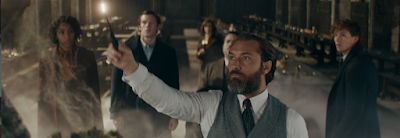I basically liked Fantastic Beasts: The Secrets of Dumbledore, but I feel a defensive crouch is necessary to broach the topic. Need I rehearse the litany of complaints the Fantastic Beasts movies have received? Many say they’re shapeless, strangely paced, full of narrative dead ends and inscrutable motivations. I agree. They have little of the sprightly British boarding school structure of the Harry Potters to which they are ostensibly prequels. Certainly true. The big villain of these pictures has accidentally been a revolving door of casting—a misjudged twist gimmick in the first, and off-screen allegations after the second, resulting in three different actors across three films. Irritating. And their creator, J.K. Rowling, has eroded the goodwill she got from writing an instant-classic work of children’s literature by spending most of her public statements of late transmitting bigoted anti-trans messages. Frustrating would be an understatement. (One hopes that, generations hence, that’ll be biographical detail and not active annoyance.) I can’t defend that, or any of the above, and I won’t. But I’ve had more of a good time than not sitting in the world these movies create. There’s the sheer pleasure of its fantasy gewgaws and the sturdy craftsmanship of its many collaborators, and, gee, even the story starts to threaten to get somewhere interesting.
While the early movies felt like so much stage-setting, this one actually starts to take off. Maybe it’s because Rowling’s screenplay was given a co-writing assist from Steve Kloves, who so smartly adapted the original novels into the wonderful films they became. Here the evil Grindelwald, fresh from committing his Crimes in the last one, continues gathering his forces to fight against tolerance of muggles. (Maybe they’ll get there in the next one. If there is a next one.) The wizard supremacist hopes to exploit weaknesses in the electoral system of worldwide magic high council or something. Only Professor Dumbledore (Jude Law) and his trusty zoologist buddy Newt (Eddie Redmayne), with some allies new (Jessica Williams) and old (Callum Turner, Dan Fogler), can sniff out a way to stop him. Maybe. They hope. It’s a little confusing, deliberately so to confound Grindlewald’s ability to see the future, a convenient excuse. ((The funniest confusion has to be a long sequences near the beginning in which Dumbledore explains why he can’t do something, then he proceeds to do it in the finale, and, when questioned, basically shrugs.) But the actors are swanning about the elaborate bits with appropriate sprightliness. They seem to know what they’re doing. There’s a lot of globe-hopping, creature-admiring, spell-casting zipping around—from an underground German torture pit with a multi-limbed critter’s tentacles stabbing out of the dark, to a mountaintop village erupting with enchanted obstacles. It’s all in service of trying to prevent a sclerotic bureaucracy from accidentally, through a combination of cowardice and corruption, letting an egotistical fascistic cult leader take over their democratic norms. When one wizard pontificates about “the peaceful transfer of power” and dithers over charging Grindlewald for his crimes, the allegory is pretty clear.
Along the way, I most admired the work of Wizarding World vets. A franchise is so much more than one person, after all. This one remains an extended victory lap for people who brought Potter to such vivid life, and as such has constant reminders of the craft that made it so appealing. Director David Yates has a patient eye for the fantasy filigrees and takes all the murmuring about hidden secrets and wizard politics very seriously. I don’t always follow it, but it clearly means something to someone, and plays like it could. When we see the Berlin Ministry of Magic with its brutalist structures and severe members, or a Bhutan temple decked out in enormous flags on rope bridges and towering staircases for an international magic election, there’s fun to the peeks into new corners of this world beyond Hogwarts. (Once more, brief stops at the old school renew its status as one of the great created locations of moviemaking.) Yates marshals the returning behind-the-camera talent to their usual high standard. This is a series with an admirable consistency of style, look, and feel. Production design from Stuart Craig gives each location, new and old, the requisite sumptuous detail—spinning with both old-fashioned appeal with its early-20th-century setting and the neat floating flourishes of magic life. The costumes from Colleen Atwood are neat, too—crisp and cool, flowing and vintage, for muggles and wizards alike. The lush orchestral score from James Newton Howard swells and fanfares with its own invention as it teases around John Williams’ iconic themes sparingly. It’s all of a piece with a fun, familiar world. Sometimes that’s enough.


No comments:
Post a Comment